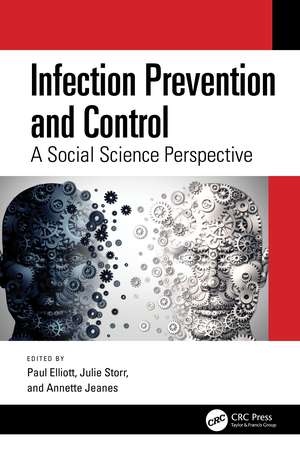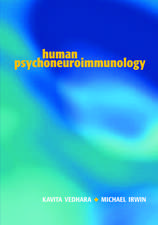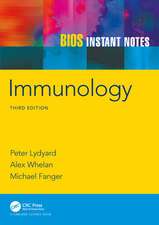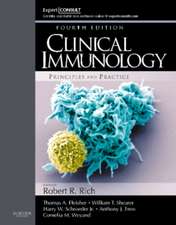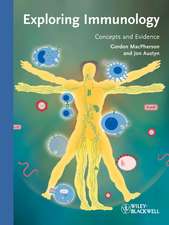Infection Prevention and Control: A Social Science Perspective
Editat de Paul Elliott, Julie Storr, Annette Jeanesen Limba Engleză Paperback – iun 2023
Key Features:
- Offers new perspectives beyond the topic area of infection prevention and control, to push the frontiers of knowledge and to challenge the status quo
- Interprofessional in nature and relevant to all those involved in the provision of medicine, health, and social care irrespective of their roles
- Truly international in nature in that the chapters have been developed by a range of individuals from across the globe
| Toate formatele și edițiile | Preț | Express |
|---|---|---|
| Paperback (2) | 288.24 lei 3-5 săpt. | +20.63 lei 6-10 zile |
| CRC Press – iun 2023 | 288.24 lei 3-5 săpt. | +20.63 lei 6-10 zile |
| CRC Press – 21 sep 2015 | 346.64 lei 3-5 săpt. | +24.01 lei 6-10 zile |
| Hardback (1) | 654.47 lei 3-5 săpt. | +23.98 lei 6-10 zile |
| CRC Press – iun 2023 | 654.47 lei 3-5 săpt. | +23.98 lei 6-10 zile |
Preț: 288.24 lei
Nou
Puncte Express: 432
Preț estimativ în valută:
55.17€ • 57.88$ • 45.77£
55.17€ • 57.88$ • 45.77£
Carte disponibilă
Livrare economică 08-22 ianuarie 25
Livrare express 24-28 decembrie pentru 30.62 lei
Preluare comenzi: 021 569.72.76
Specificații
ISBN-13: 9781032458380
ISBN-10: 1032458380
Pagini: 228
Ilustrații: 21 Tables, black and white; 4 Line drawings, color; 4 Line drawings, black and white; 1 Halftones, color; 2 Halftones, black and white; 5 Illustrations, color; 6 Illustrations, black and white
Dimensiuni: 156 x 234 x 14 mm
Greutate: 0.4 kg
Ediția:1
Editura: CRC Press
Colecția CRC Press
ISBN-10: 1032458380
Pagini: 228
Ilustrații: 21 Tables, black and white; 4 Line drawings, color; 4 Line drawings, black and white; 1 Halftones, color; 2 Halftones, black and white; 5 Illustrations, color; 6 Illustrations, black and white
Dimensiuni: 156 x 234 x 14 mm
Greutate: 0.4 kg
Ediția:1
Editura: CRC Press
Colecția CRC Press
Public țintă
Postgraduate, Professional Practice & Development, and Professional ReferenceCuprins
Part 1: Psychosocial Perspectives
Chapter 1: Psychosocial theories and approaches: Their impact upon infection prevention and control
Chapter 2: The psychosocial nature of infection prevention and control
Chapter 3: The concept of truth
Part 2: Leadership Perspectives
Chapter 4: Leadership and influence in infection prevention and control
Chapter 5: Power and compliance within infection prevention and control practice
Chapter 6: Patient safety, governance, leadership and infection prevention and control
Chapter 7: Communicating with compassion: service user perspectives
Chapter 8: The weaponising of IPC and its heart breaking consequences
Chapter 9: Why do we choose to work in infection prevention and control?
Part 3: Real world perspectives
Chapter 10: Human factors engineering in infection prevention and control
Chapter 11: How we talk about infection prevention and hand hygiene matters for behaviour change
Chapter 12: Do campaigns make you anxious: A focus on unintended consequences
Chapter 13: Educating, engaging, campaigning – social media as an adjunct to infection prevention and control
Chapter 14: Unshackling infectiousness and dismantling stigma: Gay men and HIV
Chapter 15: Physician Associates and their role in reducing the transmission of infection - a personal perspective
Chapter 16: Infection prevention and control in healthcare-built environments
Chapter 17: Musings on philosophy and infection prevention and control
Chapter 1: Psychosocial theories and approaches: Their impact upon infection prevention and control
Chapter 2: The psychosocial nature of infection prevention and control
Chapter 3: The concept of truth
Part 2: Leadership Perspectives
Chapter 4: Leadership and influence in infection prevention and control
Chapter 5: Power and compliance within infection prevention and control practice
Chapter 6: Patient safety, governance, leadership and infection prevention and control
Chapter 7: Communicating with compassion: service user perspectives
Chapter 8: The weaponising of IPC and its heart breaking consequences
Chapter 9: Why do we choose to work in infection prevention and control?
Part 3: Real world perspectives
Chapter 10: Human factors engineering in infection prevention and control
Chapter 11: How we talk about infection prevention and hand hygiene matters for behaviour change
Chapter 12: Do campaigns make you anxious: A focus on unintended consequences
Chapter 13: Educating, engaging, campaigning – social media as an adjunct to infection prevention and control
Chapter 14: Unshackling infectiousness and dismantling stigma: Gay men and HIV
Chapter 15: Physician Associates and their role in reducing the transmission of infection - a personal perspective
Chapter 16: Infection prevention and control in healthcare-built environments
Chapter 17: Musings on philosophy and infection prevention and control
Notă biografică
Paul Elliott
Paul commenced his initial nurse education in 1971 at Royal Air Force Hospital Ely, Cambridgeshire. Following this Paul undertook a number of post qualification courses. Following retirement from the Royal Air Force in 1985 Paul entered the National Health Service initially undertaking some further nurse education with the Burton upon Trent School of Nursing, Staffordshire. Following this he spent the next few years working in the accident and emergency/medical admissions settings before moving into higher education in 1991 with his current appointment being as a Senior Lecturer in Adult Nursing with Canterbury Christ Church University, Kent. Since entering higher education Paul’s primary research interests, publications and conference papers have centred around the psychosocial aspects of infection prevention and control.
Julie Storr
Julie is an MBA graduate and graduate nurse from the University of Manchester, where she also trained as a Health Visitor. She is co-founder and director at S3 Global and has worked internationally since 2005, predominantly as an expert with World Health Organisation (WHO) on the development, implementation and evaluation of initiatives in the field of patient safety, quality and infection prevention and control (IPC).
Annette Jeanes
Annette Jeanes is an independent Consultant Infection Control Nurse. She was the Infection Control lead at the Nightingale Hospital in London for the duration of the initial and subsequent London Covid-19 response. Prior to that Annette worked in the NHS as the Director of Infection Prevention & Control and Consultant Nurse Infection Control at University College London Hospitals. She has worked at several London hospitals in Infection Control, intensive care, infectious diseases, medicine and surgery. She has undertaken and published research in improving hand hygiene compliance and hospital cleaning.
Paul commenced his initial nurse education in 1971 at Royal Air Force Hospital Ely, Cambridgeshire. Following this Paul undertook a number of post qualification courses. Following retirement from the Royal Air Force in 1985 Paul entered the National Health Service initially undertaking some further nurse education with the Burton upon Trent School of Nursing, Staffordshire. Following this he spent the next few years working in the accident and emergency/medical admissions settings before moving into higher education in 1991 with his current appointment being as a Senior Lecturer in Adult Nursing with Canterbury Christ Church University, Kent. Since entering higher education Paul’s primary research interests, publications and conference papers have centred around the psychosocial aspects of infection prevention and control.
Julie Storr
Julie is an MBA graduate and graduate nurse from the University of Manchester, where she also trained as a Health Visitor. She is co-founder and director at S3 Global and has worked internationally since 2005, predominantly as an expert with World Health Organisation (WHO) on the development, implementation and evaluation of initiatives in the field of patient safety, quality and infection prevention and control (IPC).
Annette Jeanes
Annette Jeanes is an independent Consultant Infection Control Nurse. She was the Infection Control lead at the Nightingale Hospital in London for the duration of the initial and subsequent London Covid-19 response. Prior to that Annette worked in the NHS as the Director of Infection Prevention & Control and Consultant Nurse Infection Control at University College London Hospitals. She has worked at several London hospitals in Infection Control, intensive care, infectious diseases, medicine and surgery. She has undertaken and published research in improving hand hygiene compliance and hospital cleaning.
Descriere
This new book positions the specialty of IPC as more than a technical discipline concerned with microbes. It is about people and their behaviour in context and the book therefore explores a number of relevant social sciences and their relationship to IPC across different contexts and cultures.
Recenzii
"Easy to pick up and read in small sections… an interesting approach to the subject as goes beyond the pure science, t has good assessment and reflection opportunities, made to get the reader to think not just do!" - (Highly Commended, Public Health, BMA Medical Book Awards 2016)
